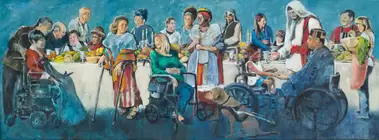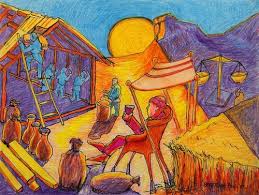
All this talk about banquets and feasts reminds me of my recent family get-together last week in Ohio. We had a grand picnic/BBQ, featuring: my brothers Mike and Mark grilling hotdogs and burgers supervised by Mader, Mark’s dog; my sister-in-law’s famous 5 bean casserole, cousin Nick’s favorite fruit salad, cousin Joe’s amazing beet and corn salads, cousin Sandy’s best brownies, and my niece Sarah’s freakingly awesome bailey’s Irish cream cupcakes. Someone managed to dredge up my mom’s traditional lemonade recipe which hit the spot. Some of us haven’t seen each other since before COVID, for some it has been 30 years. Without doubt the BBQ was the highlight of the summer.
So much we do centers on food. Business deals are seal with food. Wedding vows are usually followed by a reception. Friendships are forged and cemented around lattes, brewskis, pizzas or ice cream. What’s a birthday without a cake or something similar? Funerals and wakes traditionally are followed by a meal or repast. Most of life’s transitions, beginnings and endings and all the accomplishments in between, are marked with food – from the humble picnic to the grand banquets. Food brings people together. Even here at church, Coffee Hour is actually an extension, a sealing of our commitment to service and care of each other and our community. The Lord’s Supper is the one ritual Jesus asks us to remember him by. Meals are one way we show love for each other, as Hebrews exhorts us.
That is why rules of table etiquette have endured down the centuries. To preserve the status quo. To cement relationships. Did you pass the salt and pepper right? Did you use the right utensil, in the right manner? How did you sit? Did you use your napkin properly? Following these rules indict if you are a bonafide insider. Often it turns the banquet from being an inclusive feast, based on heavenly principles, to an exclusive feast where the majority of people are not welcome, considered unrefined, uncouth, not suitable for decent society.
Whether at a banquet or a picnic, where we sit is key. It tells you the pecking order of community. Who are getting along; who aren’t. People often vie for the seats closest to those highest in rank. In many cultures the men and women are segregated. In our own country and others, meal segregation also fell along racial lines. The best seats are reserved for the most important people, as our gospel story indicates.
In the Gospel of Luke, meals provide central settings for Jesus’ mission. As our gospel text reveals, it was the custom to invite people for a meal on the Sabbath after the worship service. The meal in our story is attended by leaders and doctors of the Law. At this Sabbath meal Jesus is among the invited guests.
Jesus begins his teaching by healing a man in front of him of dropsy (or edema, a swelling of the limbs due to a buildup of fluids). The leaders were watching closely, as Jesus performed this miracle on the Sabbath. Jesus next began to observe them closely, as people began to scramble for places of honor at the table. The Jewish Scriptures gave clear rules about seating order, and so the guests were really not speaking out of turn as they argued about their rank.
Jesus’ criticism of other invited guests seems out of place and impolite. They were following tradition, sitting according to rank. It is Jesus who breaks with tradition, whose table manners are out of place.
Even though Jesus shared several meals with Pharisees (cf. 7:36), they often complained about his choice of (other) table-fellowship companions (cf. 5:30) and about how his associates secured food on the Sabbath (cf. 6:1-4). Jesus loved food (cf. 7:33) and his disciples followed suit (cf. 5:33). So it is at this banquet that Jesus teaches us what right etiquette is. It has nothing to do with where you are at the table. It’s where you are at in your heart. What is the banquet God loves? A banquet where the poor, crippled and lame, blind are invited. A banquet where people who can never repay. Because that’s what God’s banquet looks like. All are invited. And none of us can repay the blessings we receive from God. All we can do is pay it forward -- Continue the blessing of the feast.
Many years ago, the Boston Globe told the story of an unusual wedding reception. A woman and her fiancée had arranged to have their wedding reception at the Hyatt Hotel in Boston, and as they had expensive tastes the final bill on the contract came to over $13,000. But on the day the invitations were to go out, the groom got cold feet and asked for more time to think about things. When the woman went to the Hyatt to cancel the reception she found that she could not, unless she was willing to forfeit the vast majority of what she had paid.
It turned out that ten years before this same bride had been living in a homeless shelter. She had been fortunate enough to get a good job and get back on her feet. Now she had the idea of using her savings to treat the down and outs of Boston to a night on the town. So, the Hyatt Hotel hosted a party such as it had never seen before. She and sent invitations to shelters and rescue missions throughout the city. That summer night, people who were used to eating out of garbage cans dined on chicken cordon bleu. Hyatt waiters in tuxedos served hors d’ouevres to elderly vagrants propped up by crutches and walkers. Bag ladies and drug addicts took a night off from the hard life on the sidewalks outside and sipped champagne, ate chocolate wedding cake, and danced to big band melodies late into the night. For this jilted bride to be, this unusual dinner party turned a negative experience into a positive one. It sends to us a message: what is our table etiquette?
Jesus invites to embrace this attitude as a way of life. To practice a spiritual table etiquette. An etiquette not based on utensils, china, flower arrangements and five course meals. But table etiquette concerned with love for God and for our neighbor, an eagerness to serve, a willingness to exalt others – not lording our good luck or our status over someone else. Jesus says, when you give a banquet, remember him. As we soon enter a new church season, let us remember how Jesus went to banquets and healed. How he went to banquets and forgave. How he went to banquets to provide new wine. How he went to banquets of sinners, tax collectors and prostitutes as well as renowned Pharisees. Jesus called a banquet where he broke bread, shared the cup, took on the role of servant as he washed his disciples’ feet. Remember, Jesus says, every day we are to give a banquet.
As we celebrate Welcome Back Sunday in two weeks, we are called to hospitality not just based in food, but in feeding the world that craves for love, kindness, creating hope and reconciliation. That’s the banquet to which we are called to serve, the meal our world needs every day. That’s the meal Jesus sets. All are invited. So let us celebrate a new family gathering in our new church season as Jesus did – let us keep the feast. Amen.



 RSS Feed
RSS Feed